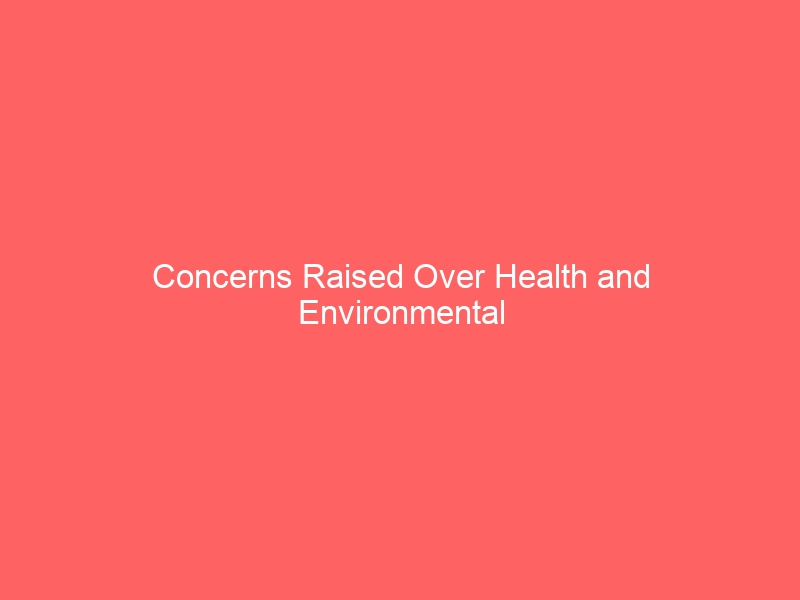Concerns Raised Over Health and Environmental Impacts of Côte dʼIvoire’s New Incinerator
Côte dʼIvoire, also known as the Ivory Coast, is a country in West Africa that has been making headlines recently for its plans to build a new waste incinerator. While the project is expected to help address the country’s waste management issues, concerns have been raised over its potential health and environmental impacts.
The incinerator, which is being built in the city of Abidjan, is set to be the largest in the country, with the capacity to burn 500 tons of waste per day. Proponents of the project argue that it will help reduce the amount of waste that ends up in landfills, as well as generate electricity from the burning process. However, opponents fear that the incinerator will release harmful pollutants into the air and pose a threat to public health and the environment.
One of the main concerns raised by critics is the potential release of dioxins and other toxic substances into the air. Dioxins are a group of highly toxic chemicals that can cause a range of health problems, including cancer, reproductive and developmental disorders, and damage to the immune system. The burning of waste, particularly plastics and other synthetic materials, can release dioxins and other harmful pollutants into the air, posing a risk to nearby communities.
Additionally, the incinerator is expected to produce ash as a byproduct of the burning process. This ash may contain heavy metals and other toxic substances that could leach into the soil and water, posing a risk to the environment and public health. Furthermore, the operation of the incinerator may also contribute to air pollution, including the release of greenhouse gases and particulate matter, which can have a range of negative impacts on human health and the environment.
Another concern is the potential impact of the incinerator on local communities. The city of Abidjan is already grappling with issues related to air and water pollution, and the addition of a large waste incinerator may exacerbate these problems. Many residents are worried about the potential health effects of living near the incinerator, as well as the impact on their quality of life and property values.
In response to these concerns, environmental and community groups have been advocating for more transparency and public participation in the decision-making process around the incinerator. They argue that the government and the company behind the project should be more open about the potential risks and impacts, and involve the affected communities in the decision-making process.
The concerns raised over the health and environmental impacts of Côte dʼIvoire’s new incinerator are not unique to this project. Waste incineration has been a contentious issue in many countries, with debates around its potential benefits for waste management and energy generation, as well as the risks it poses to public health and the environment. As countries grapple with the challenges of waste management and renewable energy generation, finding sustainable solutions that balance these factors is crucial.
In conclusion, the concerns raised over the health and environmental impacts of Côte dʼIvoire’s new incinerator highlight the complex and often contentious nature of waste management and energy generation. While the project has the potential to address the country’s waste management issues and generate electricity, the potential risks to public health and the environment must also be carefully considered and addressed. As the project moves forward, it is essential that the government, the company behind the incinerator, and the affected communities work together to ensure that the incinerator is operated in a way that minimizes its negative impacts and maximizes its benefits.
FAQs about Côte dʼIvoire’s New Incinerator
Q: What are the main concerns raised about the new incinerator in Côte d’Ivoire?
A: The main concerns raised about the new incinerator center around the potential release of harmful pollutants into the air, the production of toxic ash, and the impact on local communities and the environment.
Q: What are dioxins, and why are they a concern with waste incineration?
A: Dioxins are a group of highly toxic chemicals that can cause a range of health problems, including cancer, reproductive and developmental disorders, and damage to the immune system. They can be released during the burning of waste, particularly plastics and other synthetic materials.
Q: How can the government and the company behind the project address the concerns about the incinerator?
A: The government and the company should be more transparent about the potential risks and impacts of the incinerator, involve the affected communities in the decision-making process, and implement measures to minimize the release of harmful pollutants and the impact on public health and the environment.
Q: Are there alternative solutions to waste management and energy generation that could be considered?
A: Yes, there are alternative solutions to waste management, such as recycling and composting, as well as renewable energy generation, such as solar and wind power, that could be considered as alternatives to incineration. These options should be explored and evaluated in the context of the country’s specific needs and challenges.








